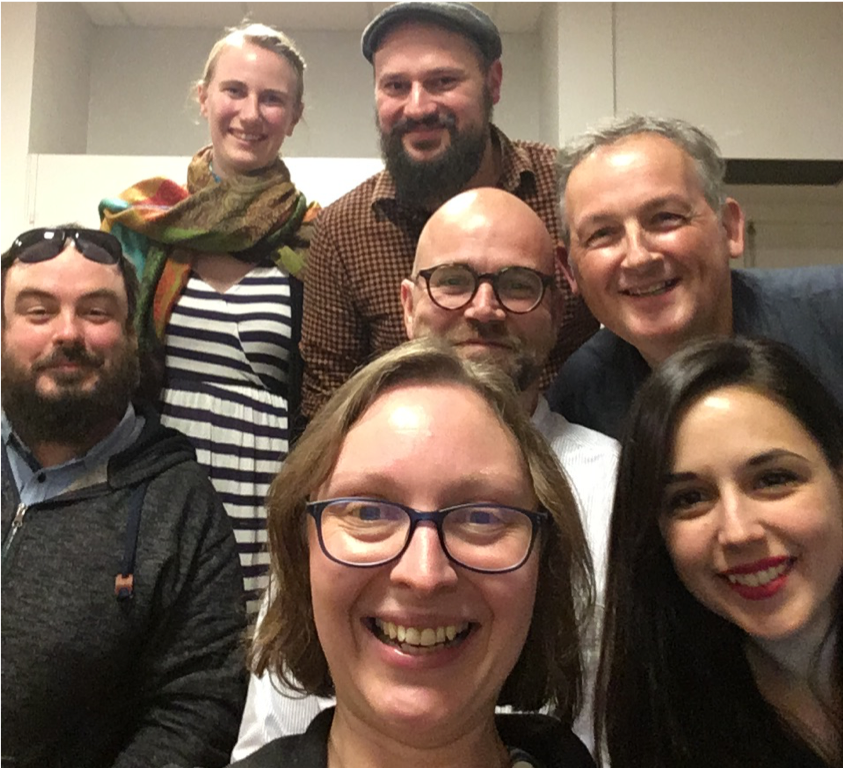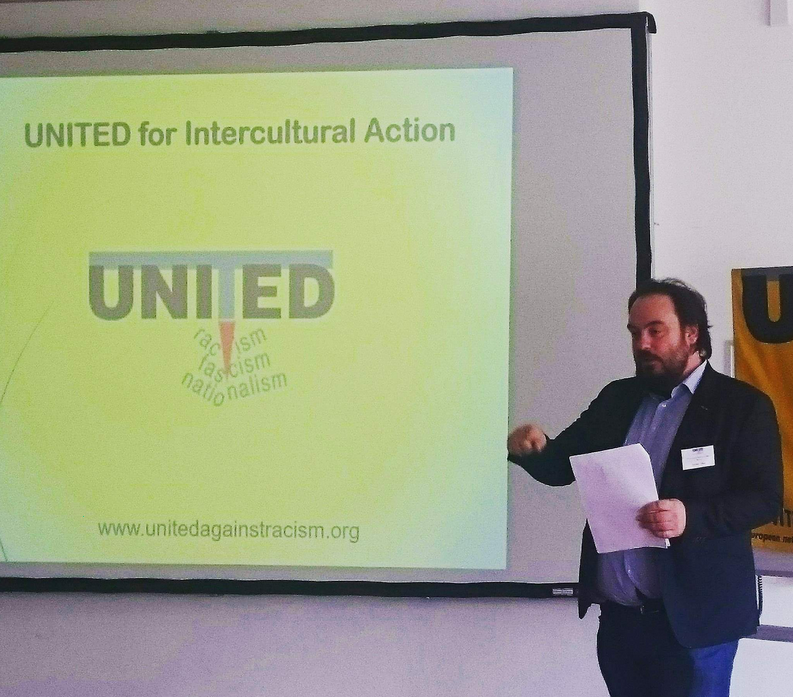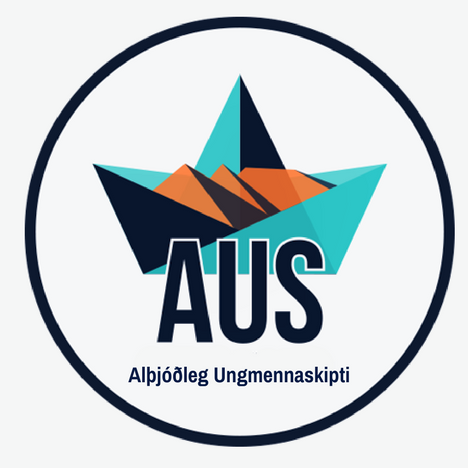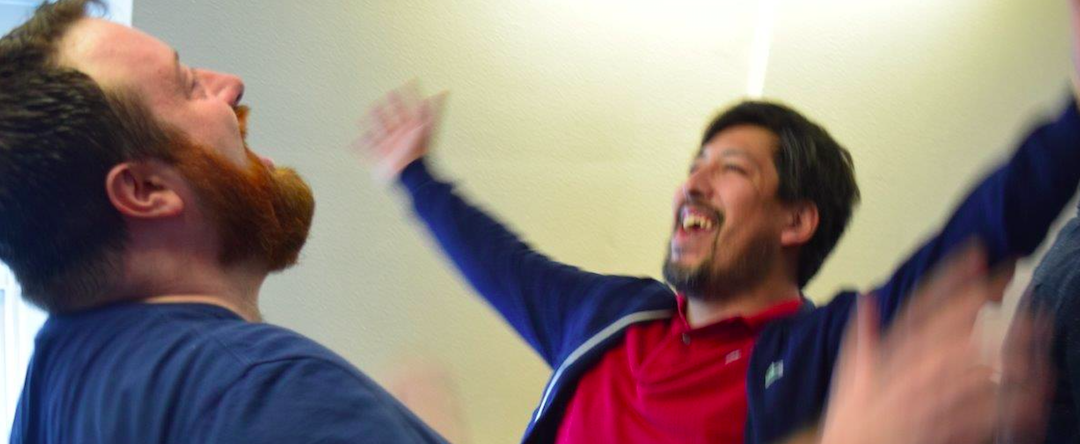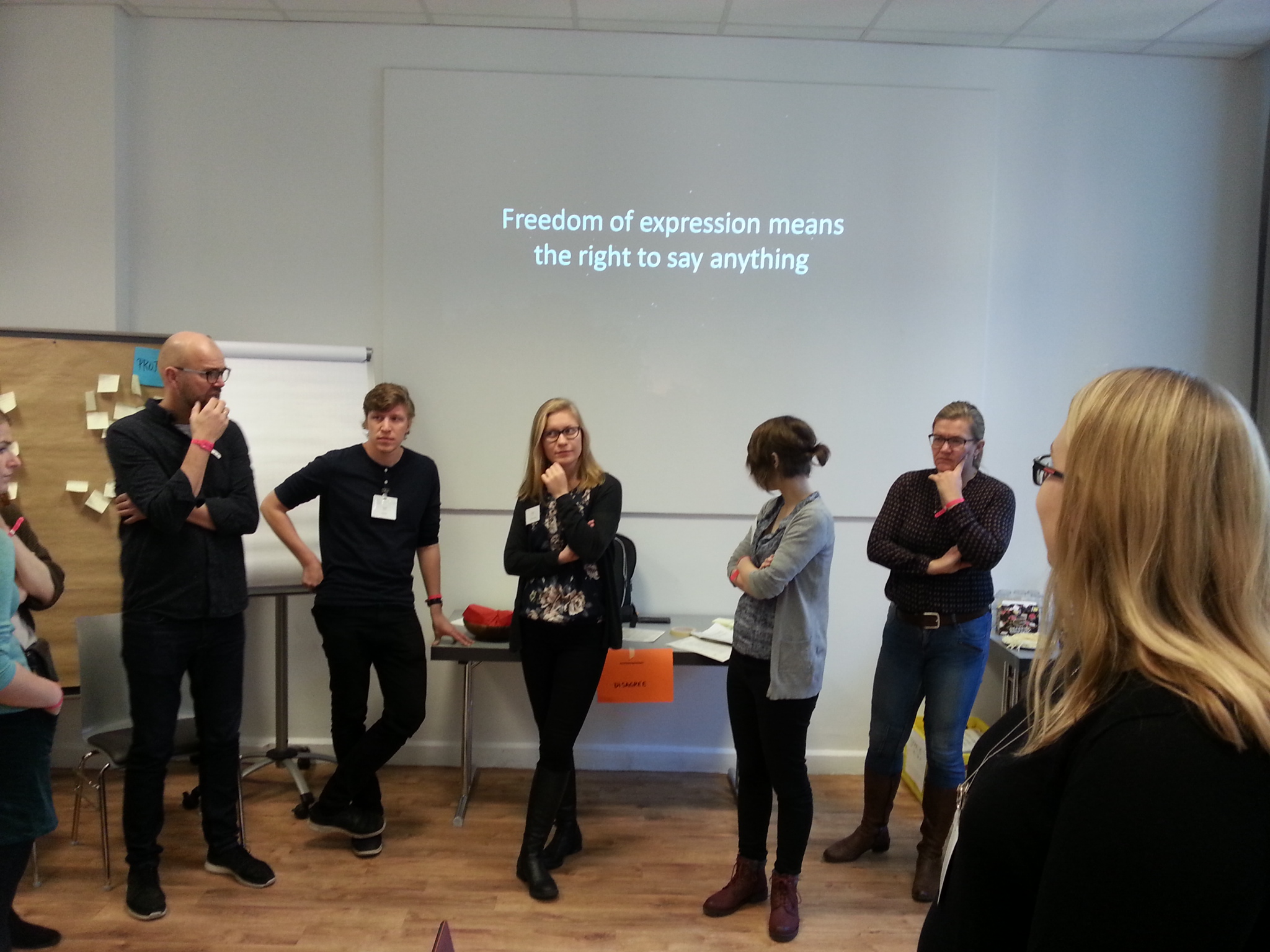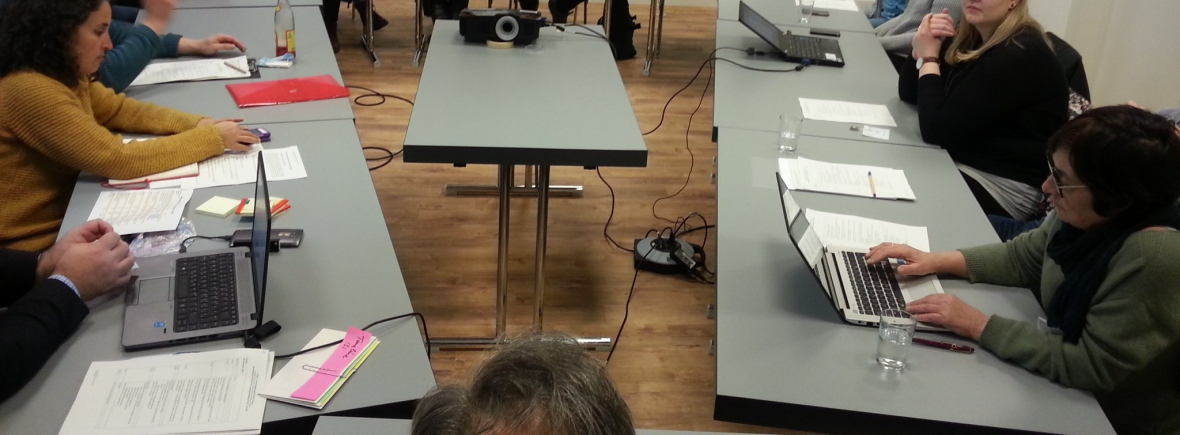A l’occasion du festival “Chalabre en Sérénades”, un de nos activités inspirés par la coopération étroite entre les partenaires du projet Erasmus+ “Star E”, les volontaires du chantier ont pu échanger avec des musicien·ne·s venu·e·s des quatre coins du monde (en l’occurrence : Etats-Unis d’Amérique, Israël, France et Allemagne) et de tout âge (de 30 à 65 ans). Les volontaires ont organisé un instant débat lors duquel chacun·e a raconté un épisode de sa vie ressenti comme une discrimination. Afro-américain, il a grandi à Détroit dans les années 60 et a vu son père mourir dans un incendie déclenché pour des revendications racistes. Cet instant intense a été l’occasion pour les volontaires de réfléchir à ses faits et notions.
Year: 2018
Chantier Mille-Pattes 2
Une soirée a été organisée sur la thématique « lutter contre les discriminations et le racisme » avec deux activités. Pour prendre conscience puis analyser les inégalités de chances liées aux privilèges sociaux, une animation souvent utilisée dans les cours intitulés anti-discriminations (qu’on retrouve dans les cursus de commerce, de droit etc.) a été proposée aux volontaires. A en croire les retours, c’est une expérience assez surprenante pour toutes et tous et chacun et chacune… (Edith, 21 ans : « Je n’avais pas conscience d’être avantagée socialement parce que j’ai plus de dix livres dans ma bibliothèque)
Au cours de la soirée, tout le monde a, semble-t-il découvert un aspect de ce qu’il/elle était ou de ce qu’il /elle renvoie.
Deciding how we share the STAR E learnings (London meeting)
This November, representatives from across the STAR E network came to London to explore the next stage of the programme, which included the kind of activities that can be done to challenge discriminatory attitudes.
Within the STAR E network is a smaller team responsible for how we will disseminate the learnings and make them accessible for the future.
This group is comprised people from a range of countries: Germany, Denmark, the United Kingdom to name a few. For STAR E meetings and for the intended dissemination we use English. Although it’s expected that when people in other countries use the activities they’re delivered in the language of the young people they’re engaging.
During the course of the day everyone in the group had been very inspired by the range of activities, and it was agreed that the dissemination should focus on providing an online resource for people to search and find the right kind of activities for the groups they work with at different times.
In discussion with the meeting facilitators we identified the kind of factors affecting how people might choose an activity. For example, the number of people they’re working with, the time available and the themes they want to cover.
By the time we finished the meeting, there were still questions to be answered, but with another session set for the next day, there was huge enthusiasm for finding these answers with the rest of the STAR E participants.
A few months ago the group had few ideas about what dissemination might look like. So it was great to have a renewed vision and purpose for how we will proceed from here!
‘Building Shared Space – Best Practices in Integration’ UNITED conference
The ‘Building Shared Space – Best Practices in Integration’ UNITED conference took place in Budapest between 22-25 May 2018 with the aim of discussing the most important challenges as well as possible solutions within the field of migrant integration in Hungary and in the European Union.
On the first day Balint Josa, Programme Coordinator of UNITED opened the conference by giving a presentation about the activities of UNITED and the local Hungarian context in terms of migration and migrant integration. The programme continued with a non-formal networking activity where participants introduced their organisations’ work to each other.
On the second day Mozer Julia from CEJI Jewish organisation presented the „Facing Facts” course that aims to tackle hate speech and hate crimes by offering online courses for civil society as well as police officers and decision-makers. Gibril Deen from Mahatma Gandhi Human Rights Organisation, gave a keynote speech presenting the challenges refugees and migrants face in Hungary and how his organisation aims to support their integration using football and sports as a tool to raise awareness and reduce racial prejudice in the Hungarian society. The afternoon continued with Tolga Karakayali’s presentation from MUDEM Refugee Support Centre, Turkey. Mr Karakayali provided an extensive overview of the situation refugees face in Turkey in terms of access to rights and services. In the last session of the day, Shumaem Bin Wasim, Migrant Community Representative of Subjective Values Foundation shared his personal experience as a migrant living in Hungary. As the closing of the day, participants engaged in discussion concerning the topics of the day and compared their national contexts, as well as discussed possible solutions that can be implemented in their own countries.
The third day of the conference began with the keynote speech of Balint Josa, Programme Coordinator of UNITED on the cultural aspects of migrant integration. Mr Josa explained the concept of multiculturalism and current and past directions in intercultural education in Europe. Mr Josa continued by presenting two successful integration projects: the ‘Get Down to Business’ project of SVF and the MAWIC project of Dekra Akademie. The programme of the conference continued with a panel discussion on the role of civil society in the migrant integration process with the representatives of OSCE/ODIHR, the European Solidarity Centre (Poland), Network of Multicultural Associations, the International Protection Service (Italy) and the NIEM Evaluation Network. Next, Mustapha Seray Bah from Art 1. Midden Nederland shared his experience as a trainer and information officer regarding the challenges that migrants face on a daily basis in terms of discrimination in the labour market. The day finished with a final roundtable session where participants engaged in a facilitated discussion on the topics of the day and shared their conclusions as well as discussed possible solutions on improving existing practices of migrant integration.
On the last day of the conference, participants had the chance to join a study visit at three national and international organisations based in Budapest, namely the Mahatma Gandhi Human Rights Organisation, Menedék Egyesület and Minority Rights Group Europe.
More info on the UNITED website: http://www.unitedagainstracism.org/
Star – E meeting at Reykjavik, Social Media Post
On May 22, AUS – ICYE Iceland uploaded a post on it’s Facebook and Instagram channels regarding the 2nd Star – E meeting held in Reykjavik in April 2018. The post featured a short description of the project and aims/outcomes of the meeting, as well as a selection of photos. Below you can find the link to those 2 posts :
Last month we had the chance to host the second transnational meeting of Star – E project. Star – E is a European…
Gepostet von AUS- Alþjóðleg ungmennaskipti am Dienstag, 22. Mai 2018
Article about our participation in the STAR E meeting in Iceland
This article was published on May 9 2018 by Socius on their Blog in German language:
https://socius.de/transnationales-treffen-in-reykjavik-projekt-star-e-standing-together-against-racism-in-europe/
Tackling racism requires common acts
Racism can only be combated by unity, that is the idea behind United for Intercultural Action (UNITED), the European network against nationalism, racism, fascism and in support of migrants, refugees and minorities.
Magazine MaailmanVaihtoa – Volunteers’ Voices asked Ana López Carlassare from UNITED to share thoughts about Europe’s situation from UNITED’s point of view. Read the article here: http://www.maailmanvaihto.fi/en/tackling-racism-requres-common-acts
MaailmanVaihtoa – Volunteers’ Voices is a magazine of Maailmanvaihto – ICYE Finland, one of the participant organizations of the STAR E program.
Press release: Launch of Standing together against Racism in Europe
Berlin, 21 November 2017
STAR E – Standing together against Racism in Europe: the launch of a new European partnership against racism
STAR E is a European Partnership project funded by Key Action 2 of the Erasmus + program of the European Union. ICJA has applied for the project on behalf of a consortium of 8 partner organizations from 8 EU countries and is now coordinating its implementation from August 2017 to July 2020.
The Star E project kick-off in Berlin
For the STAR E launch event from 28-30 November 2017, ICJA expects 14 representatives of 8 partner organizations from Denmark, Finland, France, Germany Hungary, Iceland, Slovakia and the United Kingdom. The youth hostel at Berlin Ostkreuz station, was chosen as the venue for the project kickoff meeting which will lay the ground for the cooperation of the 9 STAR E partner organizations in the coming 3 years.
Together against racism
Combatting racism at all levels of activities and structures of ICJA and its European partner organizations is the leitmotif of this project. For the participating youth and voluntary service organizations, the project should provide the opportunity to recognize and address racism in their own attitudes and actions. This requires a profound confrontation of all stakeholders and both full-time and voluntary employees with their own prejudices and racism and way of working and taking decisions.
To this end, the project STAR E foresees two face-to-face meetings of all partner organizations per year which will be used to share experiences and to develop methods and tools which then will be applied and tested in the respective organizations.
Expected results
Results of this process are, on the one hand, methods for raising the racism sensitivity in youth non-formal education activities particularly in the field of international voluntary service.
On the other hand, the racism-critical organizational development and the “change management” of the organizations will be supported. As tangible result over the course of the three years, a publication with methods, tools and materials will be developed for both areas. It is expected that the publications will be used by youth and voluntary service organizations from all over Europe to raise their anti-racist profile and coherence of activities.
Expertise
The substantive debate on both project priorities and the development of innovative educational programs, methods and tools is supported by two expert organizations who, in addition to their expertise, also have experience in networking and carrying out activities at European level: UNITED for Intercultural Action, European Network Against Nationalism, Racism, Fascism and in Support of Migrants and Refugees (Hungary) http://www.unitedagainstracism.org/ and SOCIUS, https://socius.de/ based in Berlin.
What’s still planned
After the meeting in Berlin, further partner meetings will take place: in April 2018 in Iceland, in October 2018 in the United Kingdom, in March 2019 in Finland, in October 2019 in Slovakia. A joint closing event will take place in spring 2020 in Denmark.
ICJA Volunteer Exchange Worldwide is an educational institution that organizes long-term volunteer services or short-term work camps for young people to raise their awareness about the effects of globalization.
The educational activities focus on topics such as peace and non-violent conflict resolution, the North-South divide and colonial continuities, discrimination, racism and xenophobia, intercultural competence and sustainability.
Inquiries about Star E to: Andreas Schwab aschwab@icja.de, 030 200071631
Project Launch, Berlin – November 2017
For the STAR E launch event from 28-30 November 2017 ICJA hosted 14 representatives of partner organizations in Denmark, Finland, France, Hungary, Germany, Iceland, Slovakia and the United Kingdom.
The youth hostel at Berlin Ostkreuz station, was chosen as venue for the project kickoff meeting which will lay the ground for the cooperation of the 9 STAR E partner organizations in the coming 3 years.
